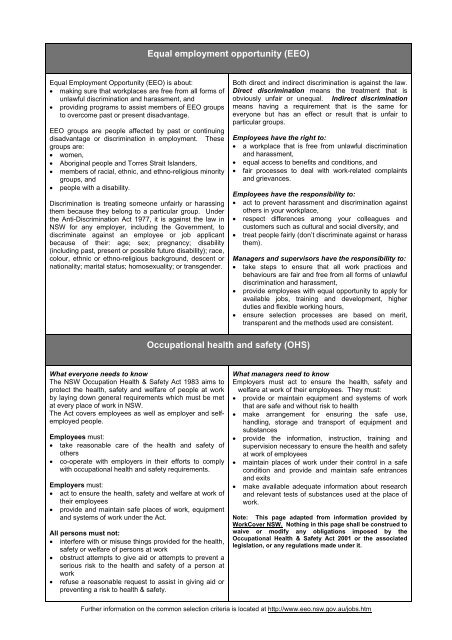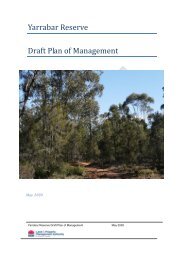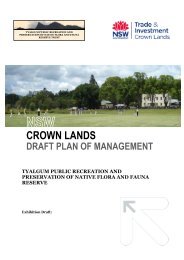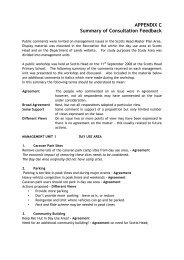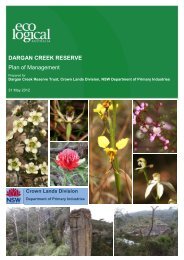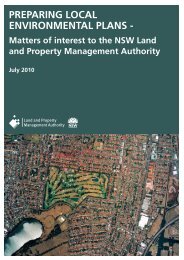Equal employment opportunity (EEO)
Equal employment opportunity (EEO)
Equal employment opportunity (EEO)
You also want an ePaper? Increase the reach of your titles
YUMPU automatically turns print PDFs into web optimized ePapers that Google loves.
<strong>Equal</strong> <strong>employment</strong> <strong>opportunity</strong> (<strong>EEO</strong>)<br />
<strong>Equal</strong> Employment Opportunity (<strong>EEO</strong>) is about:<br />
• making sure that workplaces are free from all forms of<br />
unlawful discrimination and harassment, and<br />
• providing programs to assist members of <strong>EEO</strong> groups<br />
to overcome past or present disadvantage.<br />
<strong>EEO</strong> groups are people affected by past or continuing<br />
disadvantage or discrimination in <strong>employment</strong>. These<br />
groups are:<br />
• women,<br />
• Aboriginal people and Torres Strait Islanders,<br />
• members of racial, ethnic, and ethno-religious minority<br />
groups, and<br />
• people with a disability.<br />
Discrimination is treating someone unfairly or harassing<br />
them because they belong to a particular group. Under<br />
the Anti-Discrimination Act 1977, it is against the law in<br />
NSW for any employer, including the Government, to<br />
discriminate against an employee or job applicant<br />
because of their: age; sex; pregnancy; disability<br />
(including past, present or possible future disability); race,<br />
colour, ethnic or ethno-religious background, descent or<br />
nationality; marital status; homosexuality; or transgender.<br />
Both direct and indirect discrimination is against the law.<br />
Direct discrimination means the treatment that is<br />
obviously unfair or unequal. Indirect discrimination<br />
means having a requirement that is the same for<br />
everyone but has an effect or result that is unfair to<br />
particular groups.<br />
Employees have the right to:<br />
• a workplace that is free from unlawful discrimination<br />
and harassment,<br />
• equal access to benefits and conditions, and<br />
• fair processes to deal with work-related complaints<br />
and grievances.<br />
Employees have the responsibility to:<br />
• act to prevent harassment and discrimination against<br />
others in your workplace,<br />
• respect differences among your colleagues and<br />
customers such as cultural and social diversity, and<br />
• treat people fairly (don’t discriminate against or harass<br />
them).<br />
Managers and supervisors have the responsibility to:<br />
• take steps to ensure that all work practices and<br />
behaviours are fair and free from all forms of unlawful<br />
discrimination and harassment,<br />
• provide employees with equal <strong>opportunity</strong> to apply for<br />
available jobs, training and development, higher<br />
duties and flexible working hours,<br />
• ensure selection processes are based on merit,<br />
transparent and the methods used are consistent.<br />
Occupational health and safety (OHS)<br />
What everyone needs to know<br />
The NSW Occupation Health & Safety Act 1983 aims to<br />
protect the health, safety and welfare of people at work<br />
by laying down general requirements which must be met<br />
at every place of work in NSW.<br />
The Act covers employees as well as employer and selfemployed<br />
people.<br />
Employees must:<br />
• take reasonable care of the health and safety of<br />
others<br />
• co-operate with employers in their efforts to comply<br />
with occupational health and safety requirements.<br />
Employers must:<br />
• act to ensure the health, safety and welfare at work of<br />
their employees<br />
• provide and maintain safe places of work, equipment<br />
and systems of work under the Act.<br />
All persons must not:<br />
• interfere with or misuse things provided for the health,<br />
safety or welfare of persons at work<br />
• obstruct attempts to give aid or attempts to prevent a<br />
serious risk to the health and safety of a person at<br />
work<br />
• refuse a reasonable request to assist in giving aid or<br />
preventing a risk to health & safety.<br />
What managers need to know<br />
Employers must act to ensure the health, safety and<br />
welfare at work of their employees. They must:<br />
• provide or maintain equipment and systems of work<br />
that are safe and without risk to health<br />
• make arrangement for ensuring the safe use,<br />
handling, storage and transport of equipment and<br />
substances<br />
• provide the information, instruction, training and<br />
supervision necessary to ensure the health and safety<br />
at work of employees<br />
• maintain places of work under their control in a safe<br />
condition and provide and maintain safe entrances<br />
and exits<br />
• make available adequate information about research<br />
and relevant tests of substances used at the place of<br />
work.<br />
Note: This page adapted from information provided by<br />
WorkCover NSW. Nothing in this page shall be construed to<br />
waive or modify any obligations imposed by the<br />
Occupational Health & Safety Act 2001 or the associated<br />
legislation, or any regulations made under it.<br />
Further information on the common selection criteria is located at http://www.eeo.nsw.gov.au/jobs.htm
Ethnic affairs priorities statements (EAPS)<br />
The cultural diversity of the people of NSW reflects the<br />
whole population of NSW, which comprises people from a<br />
range of cultural, ethnic, linguistic and religious<br />
backgrounds.<br />
The four principles of cultural diversity are:<br />
• All individuals in NSW should have the greatest<br />
possible <strong>opportunity</strong> to contribute to, and participate<br />
in, all aspects of public life.<br />
• All individuals and public institutions should respect<br />
and accommodate the culture, language and religion<br />
of others within an Australian legal and institutional<br />
framework where English is the primary language<br />
• All individuals should have the greatest possible<br />
<strong>opportunity</strong> to make use of and participate in relevant<br />
activities and programs provided or administered by<br />
the Government of NSW.<br />
• All public institutions of NSW should recognise the<br />
linguistic and cultural assets in the population of NSW<br />
as a valuable resource and promote this resource to<br />
maximise the development of the State.<br />
These principles of cultural diversity are the policy of the<br />
State. Accordingly, each public authority must observe<br />
these principles in conducting its affairs.<br />
Implementing the principles of cultural diversity in<br />
NSW public agencies<br />
EAPS document the agency’s strategies to achieve<br />
outcomes, together with performance measure and plans<br />
for future action. These might include:<br />
• the use of the Community Language Assistance<br />
Schemes as an active strategy in meeting the<br />
communication needs of non-English speaking clients<br />
• positioning staff language skills as a tactical resource<br />
in its integrated communications strategy<br />
• ensuring that training in cross-cultural issues is<br />
incorporated within other functional training and is<br />
regularly evaluated and revised.<br />
A number of NSW agencies have been identified as Key<br />
Agencies on the basis of:<br />
• a high degree of client contract, especially in the<br />
areas of welfare, justice, education and <strong>employment</strong><br />
• responsibility for developing and implementing<br />
government policy in these areas<br />
• agencies which administer major funding programs.<br />
These agencies are also required to work closely with the<br />
Ethnic Affairs Commission in the preparation of their<br />
EAPS and to lodge their EAPS with the Commission.<br />
Ethical practice<br />
All jobs have ethical dimensions. People working in the<br />
public sector have particular obligations to work ethically<br />
and to always act in good faith in the public interest. This<br />
is their public duty. For public officials to determine<br />
whether their decisions and actions are in the public<br />
interest, a set of ethics or principles is required. The<br />
Independent Commission Against Corruption has<br />
developed the following principles of public duty.<br />
Serving public above private interest (selflessness)<br />
Making decisions on courses of action on the basis that<br />
the chosen course best serves the public interest. No<br />
regards should be given to any other, that is private or<br />
personal, interest in taking such decisions.<br />
Integrity<br />
Ensuring that any decision taken, or choice of action<br />
made, maximises to the greatest practicable extent, the<br />
following qualities:<br />
Openness<br />
• Giving reasons for decisions<br />
• Revealing all avenues available to the client or<br />
business<br />
• When authorised, offering all information<br />
• Communicating clearly<br />
Honesty<br />
• Obeying the law<br />
• Following the letter and spirit of polices and<br />
procedures<br />
• Observing codes of conduct<br />
• Fully disclosing actual or potential conflict of interests<br />
Accountability<br />
• Recording reasons for decisions<br />
• Submitting to scrutiny<br />
• Keeping proper records<br />
• Establishing audit trails<br />
Objectivity<br />
• Fairness to all<br />
• Impartial assessment<br />
• Merit selection in recruitment and in purchase and<br />
sale of government resources (procurement and<br />
disposal)<br />
• Considering only relevant matters<br />
Leadership<br />
Demonstrating<br />
• Demonstrating, by example, the value of these<br />
principles in serving the public interest. Promoting<br />
public duty to colleagues and others in an agency and<br />
outside, by ones own ethical behaviour<br />
Courage<br />
• Acting in the public interest, as identified by reference<br />
to these principles, fearlessly, frankly and without<br />
favouritism or malice.<br />
Further information on the common selection criteria is located at http://www.eeo.nsw.gov.au/jobs.htm


